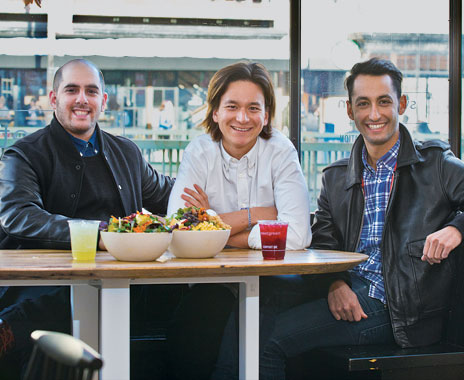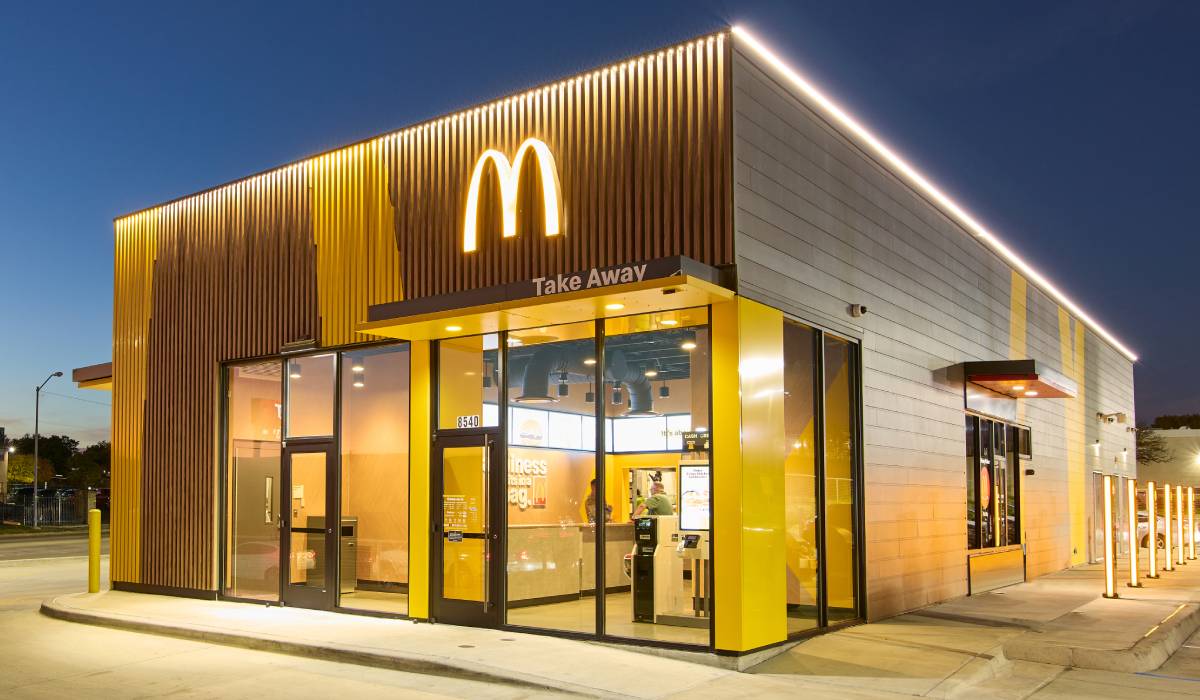These days in the quick-service and fast-casual restaurant industries, the Millennial reigns supreme. The coveted demographic, approximately 20–35 in age and roughly 80 million members strong in the U.S., is the all-important target whose liberal tastes and propensity for all things digital and social media has forced the industry into a new era of innovation and transparency.
But it’s not just the purchasing behavior of Millennial customers that is leading to big changes in the limited-service realm anymore. The generation is also increasingly leaving its fingerprints on the decision-making process, with more young guns streaming into the corporate suite or launching their own enterprises.
These young leaders share plenty in common. They talk about the importance of culture, of community, of an “anti-corporate” mentality. They’ve embedded sustainability, charity, and a healthy lifestyle into the fabric of their work. And they all admire the fast-casual chic and forward-thinking ethos of brands like Chipotle.
Meet the 11 Millennial leaders, all 35 and under, who are poised to become the next generation of influential quick-service and fast-casual leaders.
Nicolas Jammet (29), Nathaniel Ru (28), & Jonathan Neman (29)
Sweetgreen
Graduating business majors, especially from colleges like the prestigious Georgetown University, often dream of careers in investment banking, financial planning, or corporate consulting. The limited-service industry is not always among the top picks for emerging business leaders.
But Nathaniel Ru, Nicolas Jammet, and Jonathan Neman saw an opportunity in the evolving foodservice industry when they graduated from Georgetown’s McDonough School of Business in 2007.
“As students, we wanted access to this healthier, cleaner, honest food to eat, and we wanted it in an environment that was affordable and convenient,” Jammet says. “We didn’t see that, but you still saw this kind of shift in the existing fast-casual places, that they were starting to focus on healthier options or health-focused menu trends. And you saw customers starting to want it, you saw customers starting to want to know more about their food.”
“We didn’t feel like there was a place that really provided the food or stood for the values we believed in,” Neman adds. “So out of wanting to solve this problem and wanting to create something, we decided to do it ourselves.”
The result is Sweetgreen, a fast-casual salad bar the three men founded in Washington, D.C., upon graduation. Along with pre-designed and customizable salads, the restaurants offer wraps, juices, frozen yogurt, and other healthy foods using many local ingredients.
Neman says the founders’ youth and inexperience with the foodservice industry forced them to create something simple.
“So when we approached this issue of healthy eating, we had to solve it in a very simple way, and I think that’s one of the reasons that we chose salad, because salad is all about the quality of the produce and all about the source of the food,” he says.
Beyond being a destination for healthier and locally sourced foods, Sweetgreen was established as a lifestyle brand that Jammet, Neman, and Ru say they modeled on retailers like lululemon, Patagonia, Nike, and Whole Foods, as well as quick serves like Chipotle and Starbucks. Sustainability is woven into the fabric of the company, along with four other core values that Jammet says they “live and die by”: creating solutions in which the company wins, the customer wins, the community wins (the “triple bottom line”); cultivating authentic food and relationships; creating meaningful connections every day, from the farm to the customer; and making an impact on the community.
Sweetgreen opened seven new units in 2013 and now has 22 locations in five states and D.C. Last year, the company offered between 21 and 41 local ingredients on store menus, purchased $1.9 million worth of local produce, and donated $50,000 to organizations that support healthy eating in homes and schools. In addition, the brand’s SweetLife festival, a music festival that evolved from a block party the founders threw with their second unit, hosted 22 bands and 18,730 guests.
“We’re really excited to keep bringing this idea of a ‘sweet life’ to more cities and communities, and I guess the key word is community,” Jammet says. “It’s really important that when we do pick a city or a neighborhood to open in, we understand the customer there, we understand what problem we’re solving, why they want us, how we should fit into that community, and everything from menu to design to seating to who we hire.”
The founders say they have no unit-count goals at this time, but their ultimate aspiration is to be the leaders in the healthy fast-casual space. Steve Case, the former cofounder of AOL, is among the crowd believing Sweetgreen can accomplish just that. The brand recently received $22 million in funding from Case’s Revolution Growth fund, which is investing in entrepreneurs using new approaches to disrupt large industries.
“It’s a really fun industry in that you get to work with people and you get to work with food, two incredible things, and there’s a lot of opportunity,” Neman says. “I think you ’re going to see more and more educated, young people coming into this industry.”
Casey Patten (33)
Taylor Gourmet
All Philadelphia natives Casey Patten and David Mazza wanted was a decent hoagie in their adopted hometown of Washington, D.C.
When, in 2008, they stumbled upon some real estate on H Street with plenty of character but in dire need of some TLC, they decided that if they couldn’t find a good hoagie shop, they would start their own.
That H Street real estate became the first Taylor Gourmet, a fast-casual sandwich concept that Patten calls a “cooked-from-scratch kitchen meets gourmet Italian deli.” The brand has grown to nine units, each with premium and specialty ingredients, a focus on sustainability and community, and a handcrafted design that is both industrial and rustic.
“For us it was coming up with the anti-deli design,” Patten says. “So, how could we bring you into a space where you are going to eat a phenomenal, fresh hoagie in the deli and feel like you are not there? And it’s from all senses, from music to textures to the look and feel to materials.”
Patten says the fact that he and Mazza, 40, are young has helped them be able to make changes on the fly and adapt the concept to the demands of their peers. The new limited-service startup scene being driven by young, entrepreneurial operators, Patten says, has been founded on integrity—product integrity, customer integrity, operations integrity, and employee integrity. He points to Portland, Oregon–based Stumptown Coffee as a brand after which he and Mazza modeled Taylor Gourmet.
“They started really small, they believed in what they did, they grew slowly but in the right way, they interwove themselves into the community, and they essentially glued themselves to the coffee industry as the hippest, the coolest, the best roast out there,” he says. “We always take a look at them and we say that, as we continue to grow, that’s how we want to grow and that’s how we want to be perceived.”
Patten says he and Mazza have plans for the brand—which has become a favorite of President Obama and other D.C. movers and shakers—to become the “top premium sandwich provider in the industry.” Five or six units will open this year, and the company is looking into opening in additional markets and potentially nontraditional locations.
“We want to honestly become the anti-corporation that still can get things done, but isn’t broken down with bureaucracy and different levels of communication and five different levels of leaders,” he says. “We still want to be the small Washington, D.C., hoagie shop.”
[pagebreak]
Luke Holden (30)
Luke’s Lobster
Like the Sweetgreen founders, Luke Holden graduated with a business degree from Georgetown in 2007. Unlike Jammet, Ru, and Neman, however, Holden gave the investment-banking world in New York City a go before turning to the fast-casual space.
By 2009, Holden was itching to do something entrepreneurial, and his roots as the son of a small-town Maine fisherman started calling to him. Inspired by East Village fast casuals specializing in one or two menu items, Holden, together with business partner Ben Conniff, opened the first Luke’s Lobster there in October 2009.
“It was two kids that had no experience at all in the restaurant industry, and we were just creative and resourceful and forced to make decisions with limited resources, which caused us to learn on the job,” Holden says. “We certainly made mistakes, but I think that was part of our success as well, not having a pre-determined idea on how to do something.”
Luke’s Lobster, which now has 11 locations on the East Coast, is different than most fast casuals in that the menu is short—Lobster Rolls, Shrimp Rolls, and Crab Rolls, along with Clam Chowder, sides, and seasonal items—and prices are in the casual-dining range of $15–$20. But, like other fast casuals driven by young entrepreneurs, Luke’s has committed to engaging with community and doubling down on sustainability and transparency. That even led it to build a 16,000-square-foot processing facility in Maine.
“A lot of people talk a game of traceability and sourcing from sustainable resources, but we’re actually out there dealing with the fishermen, securing the product, doing the logistics of bringing live wild-caught resources into our own plant, and then assuring that the food quality and safety programs are top-notch in the industry,” Holden says.
Kristi Ritchey (32)
Greenleaf Gourmet Chopshop
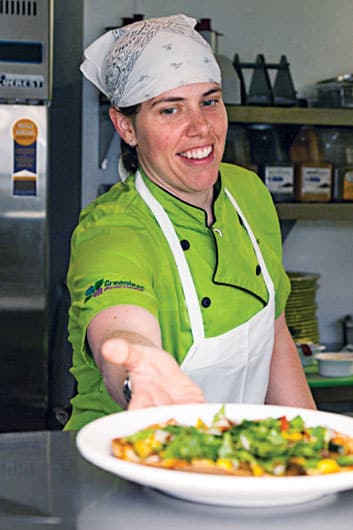 Much has been said about fine-dining players moving into the fast-casual space, whether it’s Rick Bayless with his Xoco concept or the renowned Larkspur Restaurant and its spinoff Larkburger chain.
Much has been said about fine-dining players moving into the fast-casual space, whether it’s Rick Bayless with his Xoco concept or the renowned Larkspur Restaurant and its spinoff Larkburger chain.
But perhaps none embody the health-minded, do-it-yourself attitude of Millennials quite like Kristi Ritchey, executive chef at Greenleaf Gourmet Chopshop in Southern California. Not only did she leave the same position at fine-dining restaurant Murano Restaurant and Lounge—where she was named one of Los Angeles’s top chefs by LA Direct Magazine—to join friend Jonathan Rollo at healthy-food concept Greenleaf in 2008, but she also put her money where her mouth was and lost more than 100 pounds through diet and exercise.
Now Ritchey is developing nutritious salads, sandwiches, pizzas, and more at the four-unit Greenleaf, where she says they are heavily investing in local food providers and small businesses.
“What I love about Greenleaf is that even though we’re a fast-casual company, we don’t approach our service or our food that way,” she says. “We hold to our expectations of quality customer service and quality food, the same that we did when we ran fine-dining restaurants. Everything from the customer experience to the dishes that we create, we approach it from that level, and I think that’s what sets us apart.”
Ritchey says she and Rollo are prepared to scale Greenleaf into a national concept, but for now they are focused on taking care of priority No. 1: their customers’ health.
“I think that so often in the fast-food or fast-casual industry, people are just looking for what’s the best market they can get, what’s the best profit they can get, how many target people can they get,” she says. “For us, it’s about giving people quality—a quality of life, quality food, and helping them have an overall balanced lifestyle.”
Michael Lastoria (34) & Steve Salis (31)
&pizza
For Michael Lastoria and Steve Salis, a restaurant is more than just food, furniture, and customer service. A restaurant represents memories, nostalgia, and the community surrounding it. That’s why at their Washington, D.C.–based fast casual &pizza, all of the marketing efforts are grassroots, spotlighting stories from local residents, charities, and causes making each neighborhood a better place.
“We see ourselves as social entrepreneurs as opposed to pizza makers,” Lastoria says. “Pizza is the conduit that allows us to create that social change. We’re heavily involved in the communities where we set up shop, and we want to bring people together and create real-world connections, in a time and a place where we feel that’s more important than ever.”
Lastoria and Salis ask all &pizza employees (whom they call their “tribe”) to abide by four principles: initiate change, think differently, be inspired, and tell other people. They’ve created a brand built more on the people making up the restaurants than on a carefully prescribed operating model.
“I think the companies that are going to be able to prevail over time are the ones that understand who they are. They have a definable soul and purpose and are people that focus on things that are bigger than the actual bricks-and-mortar, four-walls operating model,” Salis says.
Two &pizza units are open today, with three more under construction. While Lastoria and Salis say the brand could fit into communities all across the country, they’re taking their time shaping it into a sustainable business, one that maintains a consistent culture across the entire system. For that reason, they plan to grow only through corporate-owned locations.
“One of the big differences between our business and other restaurant groups trying to do the same thing is that we view ourselves organizationally more as a tech startup than a food business,” Lastoria says. “What that means is you’re going to see transparency, you’re going to see a much flatter organization, you’re going to see leadership that’s happening at all levels of the business, and the same goes for creativity—our best ideas are going to come from those closest to our guests. We empower everyone in the organization.
“I think prior to this you saw a lot of hierarchy and bureaucracy, and that’s changing drastically,” he adds. “What that allows us to do is it allows us to innovate quicker, it allows us to be on the forefront in everything that we do and the choices that we make.”
Jethro Naude (34)
Slapfish
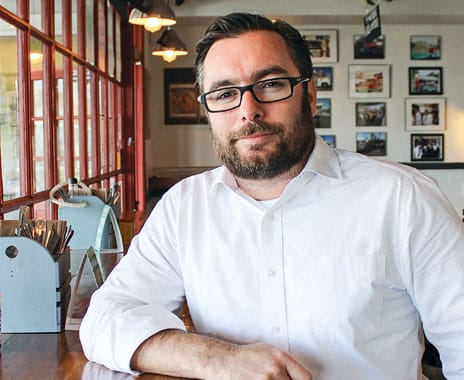 The year 2010 wasn’t a banner year for launching restaurant concepts. The Great Recession had put a strain on lending, and consumers’ discretionary incomes were tight. And yet somehow, Huntington Beach, California–based Slapfish fought through its first year with the dogged determination to become a leading fast-casual purveyor of sustainable seafood.
The year 2010 wasn’t a banner year for launching restaurant concepts. The Great Recession had put a strain on lending, and consumers’ discretionary incomes were tight. And yet somehow, Huntington Beach, California–based Slapfish fought through its first year with the dogged determination to become a leading fast-casual purveyor of sustainable seafood.
Jethro Naude, the brand’s cofounder and economist, says he and business partner Andrew Gruel threw as much money as they could into the business, which originally afforded them just a food truck. They used the truck for about a year to establish the brand, leveraging social media to put the business on the map.
“I’d like to say we applied our youth in the flexibility and the adaptability to the market,” Naude says. “When you don’t have much money and you’re young and you’re working on your feet, you kind of just use the tools that you have at your disposal.”
The entrepreneurs now have one brick-and-mortar Slapfish open, with two more on the way in Southern California and a 75-unit franchise deal signed for the Middle East. The restaurant dishes out sustainable seafood tacos, sandwiches, plates, and other items with the triple bottom line of social, environmental, and economic success at its core.
Naude says the days of cheap, greasy food are over, and that he and Gruel hope young customers’ desire for ethically sourced, high-quality food will help Slapfish grow into a national concept with hundreds of stores.
“Being young, being flexible, being adaptable, it allowed us to make changes we needed to make on the fly,” Naude says. “We haven’t been stuck in a rut, we haven’t been close-minded or naive to certain trends that are fluctuating almost on a daily basis in this industry. It allowed us to not just survive, but also strive.”
Matthew DeBusk (34)
Great Wraps
Only 34 years old, Matthew DeBusk has already been around the block in the quick-serve industry. The vice president of brand development at Atlanta-based Great Wraps had previous executive experience at Moe’s Southwest Grill and Shula’s before being recruited to help turn the 25-year-old Great Wraps into a fast casual that resonates with Millennial consumers.
And it’s not just DeBusk representing the younger generation at the company. He says chairman Mark Kaplan and president Bob Solomon, both foodservice veterans, built out a young corporate team to jumpstart the brand, which is actively overhauling its menu and growth strategy in order to better compete with national fast-casual players.
“We’ve got very diehard, aggressive, passionate people who love their jobs and love the roles that they’re serving and supporting the franchisees,” DeBusk says. “But essentially we’re designing this brand almost, it seems, for ourselves. When we think about the décor and the materials that we’re using and the minimalistic approach and the overall package—it’s not just the food, it’s not just what can we serve in terms of the menu, but what’s the overall package, the overall atmosphere that we would want to enjoy for ourselves?”
DeBusk says the balance between veterans like Kaplan and Solomon and the younger staff helps bring energy and experience to the company. “Our office mentality and our team mentality is hard-core startup mode,” he says. “It’s everybody showing up early to the office because we want to be there and we can’t wait to get started.”
Heather Perry (31)
Klatch Coffee
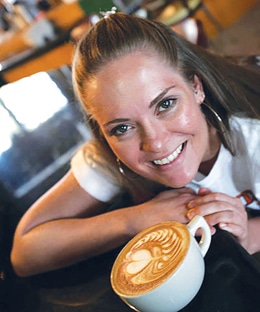 The coffee industry may be well established with brands like Starbucks, Caribou Coffee, and Dunkin’ Donuts filling out markets coast to coast, but Heather Perry, vice president and director of training and consulting for six-unit, California-based Klatch Coffee, thinks the prevalence of those brands has built a category ripe for innovation.
The coffee industry may be well established with brands like Starbucks, Caribou Coffee, and Dunkin’ Donuts filling out markets coast to coast, but Heather Perry, vice president and director of training and consulting for six-unit, California-based Klatch Coffee, thinks the prevalence of those brands has built a category ripe for innovation.
“The great thing about your Starbucks and your Caribous is they’ve opened our consumers up to a world of possibilities when it comes to coffee,” she says. “They made it the norm to come in every day and drop $5-plus on your cup of coffee. So they’ve done a lot to set the industry where it’s going.”
Perry, a two-time national barista champion and past chair of the Barista Guild of America, has been in the coffee business for 20 years, as Klatch Coffee was founded by her father, Mike Perry. These days she’s working to improve the brand through flavor and equipment innovations, as well as its sourcing practices. Klatch is building sustainable source partnerships in which it invests in the communities where its coffee beans are grown.
“It’s not a matter of buying from a farm once a year and then not looking back at that farm, but it’s a matter of how do we take this community and make coffee a sustainable part of their lifestyle,” she says. “So with our direct trade program, we’re looking at what farmers are doing in their communities and how we can support that.”
The coffee category, Perry says, is not immune to many consumer trends affecting the industry. She expects health to play a bigger role in coffee moving into the future, with customers paying closer attention to the size of their beverages and the nutrition of add-in products like milk. Transparency will also be key, she says, and she is working to educate consumers about what various coffee labels, like “fair trade” and “organic,” really mean.

